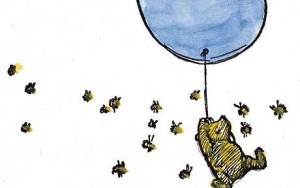Dancing For The Dead – On Losing Belief In The Soul
 As an English major at the University of Utah, I took a medieval literature class. The Teacher’s Assistant went to great lengths to remind us that he was from Brooklyn. As in, been there, done that, the-world-bores-you-when-you’re-me, everyone gimme some room. His Brooklyn accent was beyond parody.
As an English major at the University of Utah, I took a medieval literature class. The Teacher’s Assistant went to great lengths to remind us that he was from Brooklyn. As in, been there, done that, the-world-bores-you-when-you’re-me, everyone gimme some room. His Brooklyn accent was beyond parody.
By the age of twenty-three that bespectacled autodidact (his word for himself) was already a composite of every world-weary character Tommy Lee Jones would ever play on film. And for some reason, he’d always sit next to me when our professor read aloud in great guttural bursts of old English from The Epic of Gilgamesh.
One day a classmate said something about a soul. The Licentiate of Brooklyn leaned over to me and said, “I wish so bad that I could believe I had a soul, man. It’s just so hard to prove, yo. I mean, when you’re from Brooklyn, there’s a point where you’ve just seen enough that—”
Indeed, yo.
But he was right. It’s hard to prove. Not that I’d ever spent much time trying to prove I had a soul. There was no need. I’d been raised to think I had a soul, and so I did. Winnie The Pooh said “The only reason for being a bee that I know of is making honey.”
The only reason I knew for being me was being a Mormon with a soul. It was my form, function, and future.
A few years later, as a nominal Mormon who was almost completely out of the church, I was squirming and cramped, desperate to stretch, squished into a small chair in a small theater at the same university, after watching eight, or nine, or one million, excruciating modern dance numbers. Now, two hours of people thrashing around on mattresses, or thrashing around with words like “bowlegged” and “crepuscular” written on their torsos in magic marker, or thrashing around under black lights, or thrashing around while leaping through the air while wearing snorkels and bejeweled codpieces, or thrashing around as prelude to doing somersaults while wearing eye patches, might not seem like a lot, but I wasn’t one of those lucky addicts who gets hooked after the first hit of avant garde choreography.
My program informed me that there was an ambitious-sounding, eighteen minute number called “The Human Experience.” It turned out to be eighteen minutes of frantic, lithe people waving feather dusters. I suppose that to be human is to be dusty now and then.
Then the lights went out, came back up, and the final number began.
The curtains opened on a thirty-something woman sitting at a table, lovely even though she was crying. A man, presumably her husband, stood behind her, reaching out his hand as if to touch her, but acting unsure, as if he didn’t know if he should. At the back of the stage hung a gauzy white curtain, made from a delicate fabric, almost like a wedding veil.
“This couple lost their child,” my sister-in-law whispered to me. “A little boy.”
I’ve been to a lot of funerals, and I always react the same way, whether it’s a service for my beloved grandma, an acquaintance, or an acquaintance of an acquaintance: I grieve. Obviously, I don’t and can’t feel the loss of the bereaved with the same acute agony, but if I see someone grieving, truly mourning, I cry and I can’t stop. It always starts with a peculiar feeling of slowness, as if I’m half awake and underwater, even as I tell myself that maybe this will be the funeral when I keep it together.
That same slowness sank into me as the first poignant notes of a violin solo filled the auditorium. While before all had been clomping and stomping, thuds and bejeweled codpieces, these elegiac dancers, dressed in flowing dress shirts and baggy khaki pants, were so light on their bare feet that the keening of the solitary violin drowned out their movements.
They danced for their child who had died.
With graceful, sorrowful steps, the husband and wife struggled to get through a day of normal tasks, the mundane duties of their previously normal lives set to music.
The song made me feel as if I were being born aloft over pits of spikes, then pits of fluffy pillows. I was worried that the music would relent and drop me, then worried that it wouldn’t. It was almost pleasure, but for the scene on the stage.
The couple was brought to the edge of despair again and again, knees buckling and bodies shaking, only to have the other spouse catch the failing, falling partner, lifting each other, holding each other upright, or lowering one another to the ground when the grief overwhelmed.
A tall silhouette walked slowly onstage from the right, behind the white curtain. Behind the veil. A handsome young man parted the center of the curtain, stepping into a spotlight with long, exaggerated steps, on tiptoe.
If you’re a Mormon parent and your son dies, here’s how you might expect the rest of your life to unfold. You’d endure the loss and look to the blessed day when you passed from this world and were reunited with your child in the next. It’s not called Heaven in Mormon theology, but I’ll use the word for simplicity’s sake—when you enter Heaven, you pass through “the veil,” which is generally represented as the final barrier to relief and peace, a gauzy white curtain.
Perhaps you’d step through and find your boy, or maybe he wouldn’t be able to wait, after all, he’d waited so long already, and perhaps he’d run through the veil, shouting with joy, steps growing longer and longer as he swept you up, up, grown and strong, and now your eternity together could begin.
But the couple dancing on the stage wasn’t there yet, and the son couldn’t embrace his loving, stricken parents. However, he could catch them when they stumbled, dance between them close enough so that they could feel his presence, which caused them to look about in a confused mix of heartbreak and hopefulness. The family torn asunder danced as one, and the violin played on and on, a tortured perfection in the upper registers of sound.
This was the hope. That no matter what, no matter what happened in this life, you would always know something better was coming. The tragedies of your temporal existence would finally be at an end, undone, reversed, abolished, and what a reward you’d have then. All the loved ones you had lost, or alienated, would be there, and they’d be the best versions of themselves, the versions that none of us managed to achieve here on the pale blue dot.
The young man put his parents to bed. He kissed them on their foreheads. And slowly, slowly, slowly, he walked back to the veil. Perhaps a little slower than when he had entered, not wanting to say goodbye yet. Before he parted the curtain, he looked back as his mother and father held each other and their bodies began to quake again in their ritual, another day of healing placed between them and his death, another day closer to the reunion.
When the last note of the violin died, a different sort of symphony began. You’ve never heard such sniffling. I started clapping my hands just so everyone would join in and we could all applaud rather than bawl.
I was there with my family. If I died and got my chance to return from the beyond simply to comfort someone with my presence, it would be these people. They were the people I would want with me in the next world.
And yet, no matter how hard I tried—and I tried desperately—I no longer believed in a life after this one. I no longer believed that we would be together after we died. But for the first time, in that auditorium, I could confront it without being crushed beneath the weight of my impending non-existence.
In fact, it was liberating to think that maybe this life is all I get, and consequently, I should spend less time worrying about what’s coming and live better, love more, write more, laugh more, understand more, ask more, read more, serve others more diligently, and wring everything I could out of my remaining days, however many or few they might be.
I’m not much of a hugger, but that night when we all said good-bye, I squeezed my family like I might never see them again. I walked to my car, not light on my feet like the dancers, but feeling a buoyancy and hope that I’d never known when I’d thought I had a soul.
Author’s note: One of the reasons I haven’t been writing on the blog is because I’ve spent the last year or two grappling with some massive and painful questions that I didn’t feel up to exploring in writing. But I think better when I write, and I’m going to do more of this here on the blog as I try to work through some things in my head. Thanks as always.




